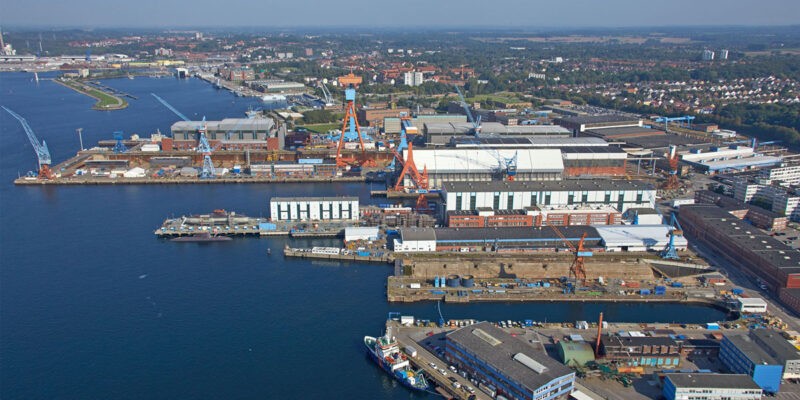Norbert Brackmann in an interview in the marineforum issue 09/2021
The German government has recognised the importance of the maritime industry late, but perhaps not too late. marineforum spoke to Norbert Brackmann about the importance of the maritime industry for Germany, its place in the European context and future challenges.

The federal government's coordinator for the maritime industry, Norbert Brackmann, will no longer be available for this position after the next parliamentary elections. Brackmann has been in this position since April 2018 and has rendered outstanding services to shipyards, suppliers, ports and other maritime sectors in Germany during this time. He played a key role in the German government's recent decisions to revise the strategy paper for strengthening the German security and defence industry and the associated classification of the entire naval shipbuilding industry as a key industry. In particular, he has helped to organise the annual National Maritime Conferences under the patronage of the Federal Chancellor.
What strategies for strengthening the maritime industry in Germany have you been guided by?
Politicians must give the maritime industry the opportunity to play to its strengths - in a fair competitive environment and through a clear regulatory line at a time of great upheaval in the industry. The German maritime industry is a technology leader, internationally competitive and efficient. And it is one of the pillars of our economy. I took up my position as the Federal Government's coordinator for the maritime industry with this in mind. There are almost 200,000 jobs in the maritime industry. It generates 2.3 times as many jobs in the economy as a whole - more than 400,000. And for every one of the 11.7 billion euros in added value that the maritime industry generates directly, it generates 2.5 times as much in the economy as a whole. Added to this are the harbours as import and export hubs of our internationally oriented economy and the navy for safety at sea and thus our international supply chains.
Strengthening the maritime economy therefore means setting the framework conditions in such a way that the industry is supported and promoted in its technological leadership and innovative strength - as a foundation for competitiveness, value creation and employment. This enables companies to exploit the potential of the far-reaching changes in environmental and climate protection in maritime transport and digitalisation. With the Maritime Agenda 2025, we have a customised framework for action that includes all areas of the maritime industry. We also take into account the heterogeneity of the industry. After all, each sub-sector has its own challenges, be it unfair pricing practices in shipbuilding, the challenges of climate protection, the expansion of ports into hydrogen hubs or - most recently - the pandemic-related shortage of freight capacity in global merchant shipping.
You initiated the Maritime Agenda 2025 and want to continue the strategic strengthening of Germany as a maritime location with the Maritime Agenda 2030. Have your initiatives and expectations been realised?
The German government's Maritime Agenda 2025 is the first overall assessment of the maritime economy and provides us with a clear framework for how we can utilise the oceans sustainably and further strengthen Germany's competitiveness as a centre for technology, production and logistics. The nine fields of action defined in the Maritime Agenda range from strengthening the maritime industry including the entire value chains and strengthening their international competitiveness, from ports to sustainability in maritime transport and the opportunities offered by digitalisation. The interim results show that many measures of the Maritime Agenda 2025 have already been implemented. The Maritime Agenda 2025 has proven to be a compass for mastering the complex challenges facing the maritime industry and policymakers alike. However, the defined fields of action are still highly topical and we need to stay on the ball. The upheavals in the industry will continue to occupy companies and politicians beyond 2025. In my opinion, this particularly concerns the issues of research and development as well as climate and environmental protection. An update with a perspective up to the year 2030 should be tackled in the 20th legislative period.
In Brussels, you argued in favour of the establishment of an EU maritime coordinator to coordinate the concerns of the European maritime industry and advocate greater maritime cooperation in Europe. Was your initiative successful or was there resistance?
I consider a joint coordinating body for the concerns of the European maritime industry to be extremely important. Many of the virulent issues not only affect us in Germany and fall equally under the responsibility of the federal and state governments, but must also be addressed at the European level. Let's take the issue of fair competitive conditions for all market participants and competitors as an example, the so-called level playing field. Here, we as Europeans must speak with a common voice. The relevant market distortions occur primarily in Asia, and the relevant regulations are multilateral. We can do more here together with our European partners. But we also have many common European concerns with regard to digitalisation and automation, the potential of offshore wind energy and the completion of the internal market on water.
I have therefore advocated the establishment of a High Level Group at EU Commission level to strengthen European networking, the development of an overarching European Maritime Strategy and the establishment of a coordinating body for the maritime industry at European Union level. Due to the Covid-19 crisis, talks with the EU Commission have not yet been finalised. However, I have received initial signals from some of our partners in Europe who also recognise the need for greater coordination at EU level. These talks should be continued at the start of the 20th legislative period. Nevertheless, we were able to advance important discussions on topics relevant to the future. At virtual ministerial conferences, the contribution that maritime and inland shipping must make to achieving the objectives of the European Green Deal and how this can also create competitive advantages was discussed. The conclusion of the conferences was that climate-neutral maritime and inland shipping is technically feasible by 2050 and can actually be achieved with a combination of regulatory, technology-neutral measures and market-driven incentives. Alternative fuels and drives play a central role here.

What are the current and future challenges facing the maritime industry in Germany?
The German maritime industry is under the influence of far-reaching global trends that harbour fundamental potential for change for the sector. When I was asked about the major challenges facing the maritime industry when I took office in 2018, my answer was digitalisation and the maritime energy transition. Three and a half years later, this statement has not lost any of its validity. We are talking about topics that have been with us for decades and that we want to help shape. With the maritime research programme, the promotion of innovation in shipbuilding, the National Hydrogen Strategy and the promotion of shore-based power systems, the German government is addressing precisely those areas where there is great potential for the maritime industry and where it has good leverage due to its excellent performance.
The Covid-19 crisis and the associated upheavals in the maritime industry are currently preoccupying us. It is encouraging that the ports have once again proven to be resilient logistics champions despite all the restrictions. Merchant shipping has also recently been able to recover economically, but the pandemic is still causing particular hardship for seafarers in particular. The cruise industry, and with it the heart of German shipbuilding, has been particularly hard hit economically. The German government is therefore supporting the industry through the coronavirus aid programmes, the debt moratorium, the economic stabilisation fund and the short-time working allowance. Above all, however, we have also invested a billion euros to make the maritime industry fit for the future and to strengthen, modernise and digitalise shipping as a climate-friendly means of transport. It is now important that the new start out of the crisis is successful. This is the key to maintaining Germany's competitiveness and the continued high level of maritime value creation and employment.
What strategic recommendations would you give your potential successor to continue strengthening the maritime industry in Germany and Europe?
By building the world's first zero-emission cruise ship with exclusively German added value before the end of this decade, we must show that we are technically capable of meeting the challenges of climate change for every class of ship. This will enable us to maintain our technological lead well into the next decade. Together with the German seaports, we must equip the infrastructure for a successful fight against climate change, i.e. ports must become energy hubs for synthetic fuels. Germany is and will remain an energy importing country!
Europe needs its own maritime strategy. We need to join forces with the EU Commission: We need a level playing field with Asia. We need joint action against climate change (certificate trading, promotion of conversion towards zero-emission ships, designation of zero-emission areas, etc.). This can only succeed with an EU coordinator for the maritime industry!
As the Federal Government's Maritime Coordinator, you are integrated into the Federal Ministry for Economic Affairs and Energy. Has this integration proved successful or would your office be more assertive in the Federal Chancellery, for example?
As the coordinator of the federal government - not of one department - you are initially perceived by the other departments as representing the interests of the BMWi. It took many individual discussions, a lot of time and a great deal of trust to create a common basic understanding of a maritime strategy and the resulting decisions in the respective departmental areas of responsibility. In terms of both the timeline and the escalation options, it would be more efficient to link up with the Federal Chancellery. In view of the new topics of oceans as energy suppliers, food producers and CO2 storage as well as securing supply chains, it would also be justified in terms of content. France has consistently created a separate ministry to fulfil these future tasks for precisely these reasons.










